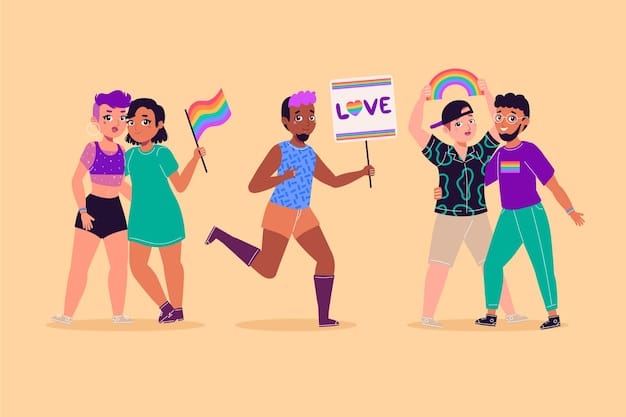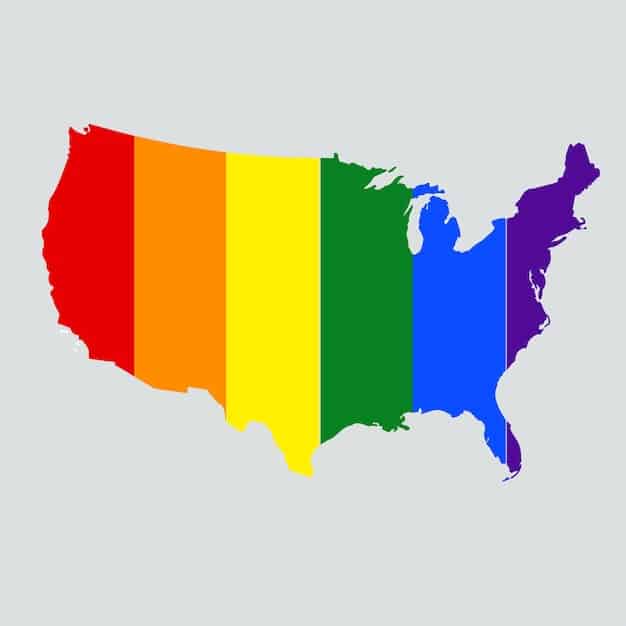LGBTQ+ Rights in the US: Current Challenges and Legislative Actions

What Are the Current Challenges Facing LGBTQ+ Rights in the US, and What Legislative Actions Can Address Them? Current challenges include discriminatory legislation, lack of comprehensive federal protections, and social stigma, which can be addressed through inclusive nondiscrimination laws, enhanced healthcare access, and ongoing advocacy for equality.
What Are the Current Challenges Facing LGBTQ+ Rights in the US, and What Legislative Actions Can Address Them? This ongoing struggle for equality faces numerous hurdles. From discriminatory laws to social biases, LGBTQ+ individuals in the U.S. continue to fight for basic human rights and protections, making legislative action crucial.
Understanding the Current Landscape of LGBTQ+ Rights in the US
The fight for LGBTQ+ rights in the United States has seen significant progress, yet substantial challenges remain. Understanding the current landscape requires acknowledging both advancements and persistent barriers faced by LGBTQ+ individuals.
Legal protections vary widely across states, and federal laws often fall short in providing comprehensive safeguards against discrimination.

Lack of Federal Protection
One of the primary challenges is the absence of comprehensive federal protections against discrimination based on sexual orientation and gender identity. While some states have enacted their own nondiscrimination laws, many lack such protections, leaving LGBTQ+ individuals vulnerable. This patchwork of laws creates uncertainty and inequality across the country.
Discriminatory State Legislation
Several states have introduced and passed legislation that directly targets LGBTQ+ individuals, particularly transgender youth. These laws often restrict access to gender-affirming care, participation in sports, and bathroom usage, infringing on basic human rights and contributing to a hostile environment.
- Religious Freedom Restoration Acts (RFRAs): These acts, at both the state and federal levels, have sometimes been used to justify discrimination against LGBTQ+ individuals based on religious beliefs.
- Bathroom Bills: These laws restrict transgender individuals from using public restrooms that align with their gender identity.
- Restrictions on Gender-Affirming Care: Numerous states have introduced or passed legislation that limits or prohibits access to medical care for transgender youth.
Overall, the current landscape is marked by legal inconsistencies, discriminatory legislation, and ongoing debates over fundamental rights.
Healthcare Access and Disparities
Access to healthcare remains a significant challenge for many LGBTQ+ individuals. Disparities in healthcare access and quality contribute to poorer health outcomes within this community.
Discrimination, lack of understanding from healthcare providers, and financial barriers all play a role in hindering access to necessary medical services.
Discrimination in Healthcare Settings
Many LGBTQ+ individuals report experiencing discrimination from healthcare providers and staff. This can range from subtle biases to outright denial of care, leading to feelings of mistrust and reluctance to seek medical attention. Such discrimination can have serious consequences for their health and well-being.
Lack of Understanding and Training
Many healthcare providers lack adequate training on LGBTQ+-specific health issues, leading to misunderstandings and inappropriate treatment. This can result in misdiagnosis, inadequate care, and further health disparities within the LGBTQ+ community.
- Mental Health: LGBTQ+ individuals are at a higher risk for mental health conditions such as depression, anxiety, and suicidal ideation.
- HIV/AIDS: Despite advances in treatment, HIV/AIDS continues to disproportionately affect gay and bisexual men.
- Cancer Screening: Lack of access to proper cancer screening can lead to delayed diagnoses and poorer outcomes for LGBTQ+ individuals.
Addressing these healthcare disparities requires comprehensive training for healthcare providers, policies that prohibit discrimination, and increased access to affordable and inclusive healthcare services.
Combating Social Stigma and Discrimination
Social stigma and discrimination continue to be pervasive issues affecting the LGBTQ+ community. These biases can manifest in various forms, impacting individuals’ daily lives and overall well-being.
Addressing social stigma requires education, advocacy, and policies that promote inclusivity and acceptance.

Impact on Mental Health
Social stigma has a profound impact on the mental health of LGBTQ+ individuals. Experiences of discrimination, rejection, and prejudice can lead to increased rates of depression, anxiety, and suicidal ideation. Creating supportive environments and promoting mental health resources are essential for addressing these issues.
Discrimination in Employment and Housing
Many LGBTQ+ individuals face discrimination in employment and housing. This can include being denied jobs or promotions, facing harassment in the workplace, and being denied housing opportunities. Federal and state laws are needed to protect LGBTQ+ individuals from discrimination in these areas.
Combating social stigma and discrimination requires a multi-faceted approach that includes education, advocacy, and policy changes. Creating inclusive and accepting environments will contribute to improved outcomes for LGBTQ+ individuals.
Legislative Actions to Promote LGBTQ+ Rights
Legislative actions play a crucial role in advancing LGBTQ+ rights and addressing the challenges faced by this community. Enacting comprehensive nondiscrimination laws, expanding healthcare access, and protecting transgender rights are key steps towards achieving equality.
Advocacy, education, and grassroots activism are essential for推动legislative change and creating a more just and equitable society.
The Equality Act
The Equality Act is a proposed federal law that would amend the Civil Rights Act of 1964 to include protections based on sexual orientation and gender identity. This would provide comprehensive nondiscrimination protections in employment, housing, public accommodations, and other areas.
Protecting Transgender Rights
Protecting the rights of transgender individuals requires legislative action to ensure access to gender-affirming care, the right to use public facilities that align with their gender identity, and protection from discrimination in all areas of life. These measures are essential for promoting the health and well-being of transgender people.
- Nondiscrimination Laws: Enacting laws that prohibit discrimination based on gender identity in employment, housing, and public accommodations.
- Access to Gender-Affirming Care: Ensuring that transgender individuals have access to necessary medical care, including hormone therapy and surgery.
- Inclusive Policies: Implementing policies that support transgender individuals in schools, workplaces, and other settings.
Legislative action is critical for advancing LGBTQ+ rights and creating a society where all individuals are treated with dignity and respect.
The Role of Advocacy and Activism
Advocacy and activism play a vital role in advancing LGBTQ+ rights and holding elected officials accountable. Grassroots movements, community organizations, and individual advocates are essential for driving change and amplifying the voices of LGBTQ+ individuals.
Through education, mobilization, and direct action, advocates and activists work to raise awareness, challenge discriminatory policies, and promote inclusivity.
Community Organizing
Community organizing is a powerful tool for building support for LGBTQ+ rights and mobilizing people to take action. By bringing together diverse groups of people, community organizers can create a collective voice and advocate for change at the local, state, and national levels.
Political Engagement
Engaging in the political process is essential for advancing LGBTQ+ rights. This includes voting, contacting elected officials, participating in rallies and demonstrations, and supporting LGBTQ+-friendly candidates. By making their voices heard, LGBTQ+ individuals and allies can influence policy decisions and shape the future.
Advocacy and activism are powerful forces for change. Through collective action and sustained engagement, LGBTQ+ individuals and allies can create a more just and equitable society for all.
The Importance of Education and Awareness
Education and awareness are crucial for combating prejudice and promoting understanding of LGBTQ+ issues. By providing accurate information and challenging stereotypes, education can help to create a more inclusive and accepting society.
Schools, workplaces, and communities all have a role to play in promoting education and awareness of LGBTQ+ rights.
Diversity and Inclusion Training
Diversity and inclusion training programs can help to educate people about LGBTQ+ issues and promote understanding and empathy. These programs can be implemented in workplaces, schools, and other settings to create more inclusive environments.
Challenging Stereotypes
Challenging stereotypes is essential for combating prejudice and discrimination. By promoting accurate representations of LGBTQ+ individuals in media, education, and other areas, it is possible to break down harmful stereotypes and promote understanding and acceptance.
- Inclusive Curriculum: Implementing inclusive curriculum in schools that reflects the diversity of LGBTQ+ experiences.
- Awareness Campaigns: Conducting public awareness campaigns to educate people about LGBTQ+ issues and challenge stereotypes.
- Community Events: Organizing community events that celebrate LGBTQ+ culture and promote understanding and acceptance.
Education and awareness are essential for creating a society where all individuals are treated with dignity and respect.
| Key Point | Brief Description |
|---|---|
| 🏳️🌈 Discrimination | LGBTQ+ individuals face discrimination in various areas, from employment to housing. |
| 🏥 Healthcare Access | Disparities in healthcare access and quality impact LGBTQ+ individuals’ well-being. |
| 🏛️ Legislative Actions | Nondiscrimination laws and transgender rights protections are crucial legislative steps. |
| 📢 Advocacy & Activism | Community organizing and political engagement are essential for driving change. |
Frequently Asked Questions
▼
Discriminatory practices include denial of services due to sexual orientation, workplace bias, and restrictions on gender-affirming care for transgender youth. These practices perpetuate inequality.
▼
The absence of federal protections leaves LGBTQ+ individuals vulnerable to discrimination in states without specific laws. This creates legal uncertainty and disparities in rights.
▼
The Equality Act is a proposed federal law that would add sexual orientation and gender identity to existing civil rights protections, providing comprehensive nondiscrimination safeguards nationwide.
▼
Healthcare access is challenging due to discrimination from providers, inadequate training on LGBTQ+ health issues, and financial barriers. These factors contribute to poorer health outcomes.
▼
Education promotes understanding and empathy by providing accurate information and challenging stereotypes. This helps create more inclusive environments in schools, workplaces, and communities.
Conclusion
Addressing the challenges facing LGBTQ+ rights in the US requires comprehensive legislative actions, ongoing advocacy, and increased education and awareness. By working together to promote equality and justice, we can create a society where all individuals are treated with dignity and respect.





